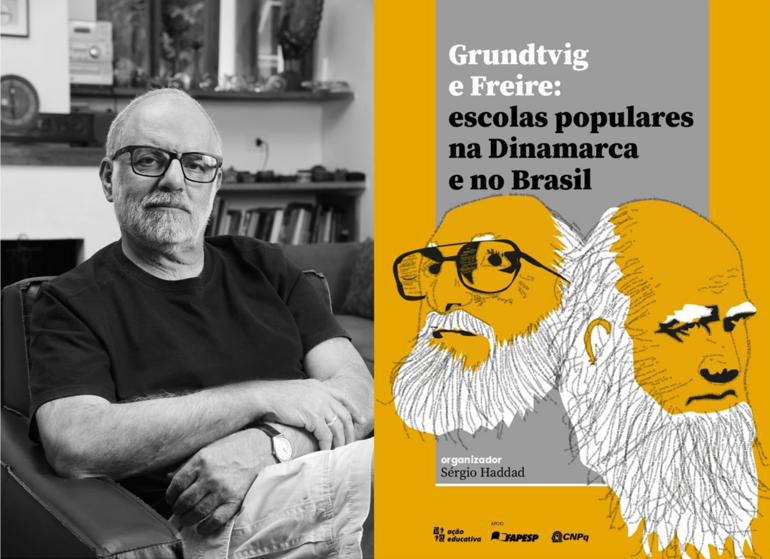The anthology Grundtvig e Freire: escolas populares na Dinamarca e no Brasil can be found online as an open source publication. Out of nine chapters in the book, three are in Portuguese and six are provided in both Portuguese and English. Besides the new research executed by Sérgio Haddad, Gabriela Zeppone and Janaina Uemura, the book is a compilation of newer texts written by various researchers. Anders Værge from Center for Praksisudvikling (Centre for Development of Praxis) made a Danish translation of the introductory chapter which incorporates Haddads preliminary conclusions on the research project. A Danish introduction to the online book can be found in the Folk High School Magazine.
Clay Warren has written the following review of Haddad's anthology.
A Brief Introduction to S. Haddad (Ed.),
Grundtvig e Freire: escolas populares na Dinamarca e no Brasil
[Grundtvig and Freire: Folk high schools in Denmark and in Brazil.]
By CLAY WARREN
Published in Church and Life, (August 2021, Vol. LXIX, No. 8), pp. 10-11.
Connections between the educational philosophy of Denmark’s N.F.S. Grundtvig (1783-1872) and Brazil’s Paulo Freire (1921-1997) have been made from time to time; however, these interrelationships have never been the subject of a major treatise nor has a book detailing Grundtvigian ideas been published in Portuguese until now. In late 2020, such a book became available to people who would like to learn more about these major advocates for the classroom as an agency of social change: Grundtvig e Freire: escolas populares na Dinamarca e no Brasil. The book is comprised of eight chapters (not counting the introduction), six of which (those that are English-language-based) are provided in both Portuguese and English.
Freire’s best-known work is Pedagogy of the Oppressed (published in English in 1970). In it we learn that students should not be passive “piggy banks” in which knowledge is deposited (“banker education”), but active agents facilitating their own learning process.
Grundtvig’s educational ideas finally were consolidated and published in English in 2011 as The School for Life. A corresponding idea to Freire’s banker education is Grundtvig’s “school for death” in which students are crushed into conformity by externally derived ideals; instead, they should be involved in reciprocal teaching engaged through the living word.
These ideas were examined in Grundtvig and Freire. It was found that both Grundtvig and Freire believed that the ultimate reason for learning is enlightenment of life (as Grundtvig put it) or in raising awareness (conscientizacão, as Freire put it). With appropriate enlightenment and awareness, a person is then able to knowledgeably engage in social participation to help run a government by the people for the people (as Americans put it).
In addition to exploration of these philosophers’ educational principles, a case study was done to collect data about how two longstanding Danish folk high schools have been organized over the past 175 years. A Brazilian team made two academic visits in 2018 and 2019 to Brenderup FHS and the International People’s College in Helsingør. Why was this deemed necessary? As the team put it, the “Scandinavian experience” is hardly well known in Brazil and studying it would help close the gap between the Danish and Brazilian knowledge reservoirs.
Sérgio Haddad, the editor, graduated with a Doctorate in History and Philosophy of Education at the University of São Paulo. He is a researcher and coordinator at NGO Acão Educativa, and until last year a professor at the Post- Graduate Programme in Education of the University of Caxias do Sul, and Senior Researcher at CNPq. He has been a champion of Brazilian youth and adult education for most of his career, defending the process of education as a human right for all people.
Sérgio decided to buttress his Brazilian-based team with selected authors representing other countries known for Grundvigian-based studies, with six scholars from Brazil and six scholars from an international pool. The list of contributors includes: Sérgio Haddad, Gabriela Zeppone, Janaina Uemura, Maria Clara Di Perro, Angélica Kuhn, and Roberto Cattelli Jr. - Brazil; Ove Korsgaard - Denmark; Clay Warren and Carrie Ann Welsh - U.S.A.; Asoke Bhattacharya - India & Bangladesh; Marcella Milana - Italy & England; and Tore Sørensen - Belgium.
